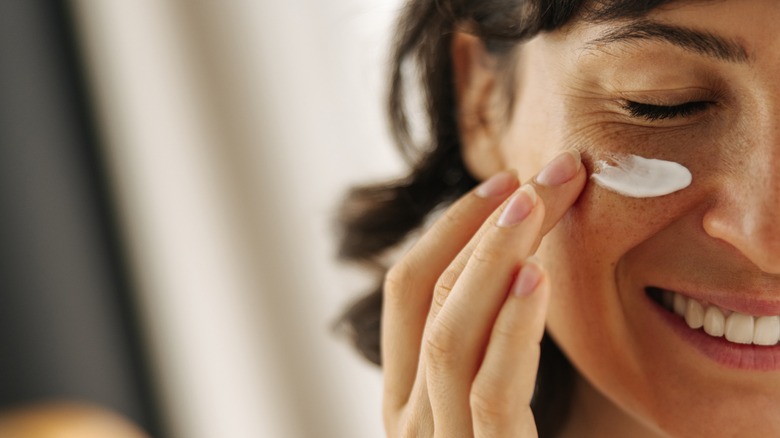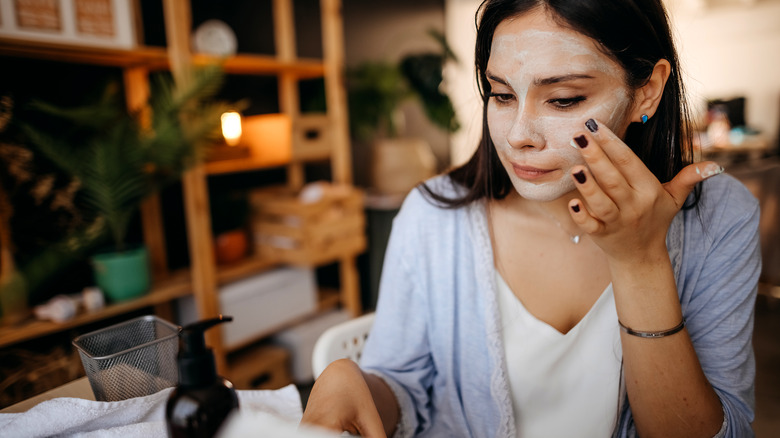Hydrating & Moisturizing Your Skin Are Very Different Things (You Need Both, Btw)
We may receive a commission on purchases made from links.
Having oily skin isn't ideal, but parched skin might be even worse. When your skin desperately needs water, you're more susceptible to scaling, itching, peeling, and even breakouts. Your fine lines, should you have any, may also appear more prominent, which doesn't help if you want to appear healthy and youthful. If you feel like your skin could use some extra H20, look into hydrating products and moisturizers to replenish the moisture your skin lacks. Just be aware that, yes, there's a difference between the two.
Before discussing what separates hydration from moisturizing, we need to define both dry and dehydrated skin. Basically, dry skin lacks oil, while dehydrated skin hankers for water. As such, treating dry skin entails drawing in more moisture, while combating dehydrated skin involves products that lock that moisture in, bringing the bounce back to your complexion. To achieve both tasks, you need both hydrating and moisturizing agents.
The difference between hydration and moisturizing
Healthy skin is hydrated and moisturized skin. However, while it's easy to conflate hydrating and moisturizing products, since both make sure that your skin doesn't feel or appear dull and taut, they work differently. Dr. Joshua Zeichner, the director of cosmetic and clinical research in dermatology at Mount Sinai Hospital, told The Klog that hydrating agents "add water to the skin, as well as help to trap water," while moisturizers "actually try to improve the skin by decreasing water loss."
Now, how do this help you build a skincare routine, you ask? It's actually quite simple. While speaking with Coveteur, dermatologist Dr. Annie Gonzales explained that hydrating products come in the form of humectants like hyaluronic acid and glycerin, while moisturizing ingredients are typically found in occlusives like silicones, oils, butters, and waxes. "Humectants, which hydrate the skin, pull water into the [skin] from within the body or the environment," Gonzales says. In contrast, "[Occlusives, which moisturize the skin,] seal in water and help shore up the skin's barrier functions."
Should you focus on hydration or moisturizing?
As previously mentioned, your skin should be both hydrated and well-moisturized, but depending on your needs you may need to prioritize one over the other. "People can have hydrated but dry skin or dehydrated but moisturized skin," dermatologist Dr. Anne Gaunche explained to Dermstore.
You can easily tell which you need more by performing a simple pinch test. Try pinching the skin on either your cheek or the back of your hand. If it doesn't return to its normal form almost immediately, your skin is dehydrated, and you need to introduce more humectants to your skin care regimen. On the other hand, if your skin is dry, you'll find that it's often flaky and itchy. In that case, you need more moisturizing products.
Then again, no skin moisturizing or hydrating products will work if you're not making an effort to keep your whole body hydrated, too. In addition to maintaining a skincare routine, drink lots of water. "When we think of water weight elsewhere on the body, we think of bloating and swelling," dermatologist Dr. Ross C. Radusky said to Allure. "It's the same thing on our skin. When hydrated, our skin cells swell, and this can be a great thing. It minimizes the appearance of fine lines and wrinkles, and generally makes us look less tired."


